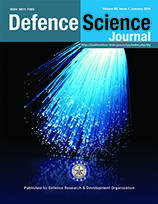Effect of L-carnitine and Hoodia gordonii Supplementation on Metabolic Markers and Physical Performance under Short Term Calorie Restriction in Rats
DOI:
https://doi.org/10.14429/dsj.66.9178Keywords:
Calorie restriction, Hoodia gordonii, L- carnitine, appetite regulatory peptides, forced swim testAbstract
Calorie restriction can occur as a consequence of food shortage due to natural calamities, war like situations or voluntarily for health benefits. This state of negative energy balance leads to decrease in performance and increase in feeling of hunger. A normal individual can sustain himself on stored energy in form of body fat for a period of time. It was hypothesised that use of an appetite suppressant like Hoodia gordonii along with L-carnintine, which helps in fat oxidation can be used as strategy for coping adverse situation without compromising physical performance. The aim of the study was to evaluate the combined effect of H. gordonii and L-carnitine supplementation on metabolic changes and appetite regulatory peptides during calorie restriction. Male albino rats were divided into two groups (n=12 in each) i.e. control (without treatment) and treated (H. gordonii organic solvent extract and L-carnitine, orally for 5 days at a dose of 100 mg/kg under 25 per cent calorie restriction). Biochemical variables including regulatory peptides were estimated along with physical efficiency tests. Significant changes in ghrelin, leptin, corticosterone and thyroid hormones were observed in comparison to control. While blood glucose, AMP kinase decreased significantly in the treated group, an increase in CPT-1 activity was observed compared with controls. It is concluded that approach could be practically suitable and effective in emergency situations of combat or food shortage.
Downloads
Published
How to Cite
Issue
Section
License
 Where otherwise noted, the Articles on this site are licensed under Creative Commons License: CC Attribution-Noncommercial-No Derivative Works 2.5 India
Where otherwise noted, the Articles on this site are licensed under Creative Commons License: CC Attribution-Noncommercial-No Derivative Works 2.5 India


